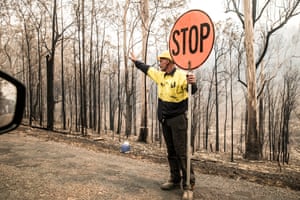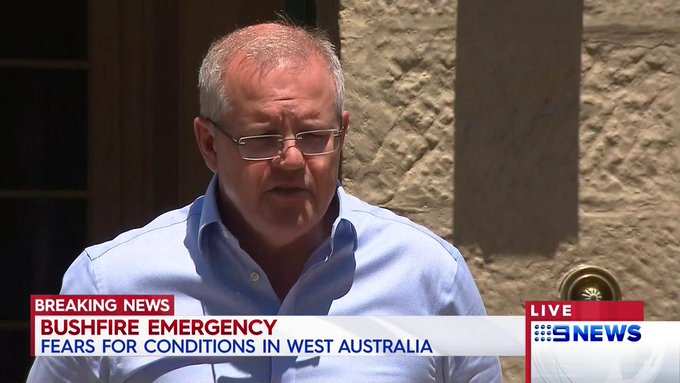Summer was yet to begin and the bush was on fire. But the last thing on the government’s mind was climate change
Even for modern Australian political discourse, it jarred.
Michael McCormack, deputy prime minister and representative of regional and rural electorates, began the week by “calling out” those “raving inner-city lunatics” who dared to link climate change with Australia’s worsening bushfire season.
“We’ve had fires in Australia since time began, and what people need now is a little bit of sympathy, understanding and real assistance – they need help, they need shelter,” McCormack told the national broadcaster.
“They don’t need the ravings of some pure, enlightened and woke capital city greenies at this time, when they’re trying to save their homes, when in fact they’re going out in many cases saving other peoples’ homes and leaving their own homes at risk.”
The comments
were made early Monday morning as the nation woke to learn it was
facing a “catastrophic” fire emergency along much of the east coast,
with worse conditions to come.Michael McCormack, deputy prime minister and representative of regional and rural electorates, began the week by “calling out” those “raving inner-city lunatics” who dared to link climate change with Australia’s worsening bushfire season.
“We’ve had fires in Australia since time began, and what people need now is a little bit of sympathy, understanding and real assistance – they need help, they need shelter,” McCormack told the national broadcaster.
“They don’t need the ravings of some pure, enlightened and woke capital city greenies at this time, when they’re trying to save their homes, when in fact they’re going out in many cases saving other peoples’ homes and leaving their own homes at risk.”
Emotions were already high. Three people – Julie Fletcher, George Nole and Vivian Chaplain – had died in the 48 hours prior, as a firestorm swept across their northern New South Wales properties.
Australia has always equated the start of summer with bushfire season. But every year it seems to get earlier. It began in September, the first month of spring, for Queensland, when fire crews battled to save life and property in areas which had stood untouched by bushfires for decades.
Then, rainforest burned. Just over four weeks later and rural firefighter volunteers and emergency service personnel got the call again, with fires stretching from the mid-north coast of NSW to the Queensland border. Summer was yet to begin, and Australia was already on fire.
McCormack’s comments followed criticism of a prime ministerial tweet offering “thoughts and prayers” as the bushfire crisis took hold.
Our thoughts and prayers are with those who have been so directly and horribly impacted by these fires. https://twitter.com/9newsaus/status/1192981905022472192 …
Scott Morrison, who less than three years ago smuggled a piece of coal
into parliament as a question time prop, imploring “this is coal – don’t
be afraid, don’t be scared” at the opposition, and now leads a
government threatening to crack down on environmental activism against the resource sector, was condemned by Greens MPs for inaction on climate change.
I’m deeply saddened by the loss of life. Hearts go out to all affected & to brave firefighters.
But words & concern are not enough.
The PM does not have the climate emergency under control.
Unless we lead a global effort to quit coal & cut pollution, more lives will be lost.
But words & concern are not enough.
The PM does not have the climate emergency under control.
Unless we lead a global effort to quit coal & cut pollution, more lives will be lost.
It was in that context that McCormack, in the face of disgruntled rumblings within his own party room, where a former leader who maintains electoral popularity and media cut-through still sits, turned his outrage meter to 11, sparking Australia’s week of stupid in the process.
From the ABC studios in Sydney, the interview spread as quickly as smoke. From Ballarat in the south-east to South Australia’s border towns, Townsville in the north, Perth in the west and everywhere in between, McCormack’s “raving inner-city lunatics” comments overshadowed almost everything but the fire coverage itself.
It set the tone for the week in political discourse. Wanting to talk about climate change as a cause of the increasingly unpredicted and unprecedented bushfires marked you as a “leftie”. Those on the right pointed to “Green party” policies as having stymied hazard reduction efforts and other fire preparations.
Neither was true. But McCormack’s comments took hold, fuelling debate about whether or not Australia was allowed to have a debate on climate change as more than 100 fires scarred the landscape and capital cities were choked by smoky haze.
More than 2,000 news articles, opinion pieces, radio slots and TV segments were taken up by the comments. The prime minister and his opposition counterpart shared a “not today” unity ticket whenever climate change was raised, while authorities, past and current, stressed all preparations had been made within a shortening window of time, exacerbated by the record drought, as they tried to inject some facts into the debate.
McCormack’s comments were still ringing around the country as the man who used to hold his position, as deputy prime minister and leader of the National party, attempted to interject his own take into the debate. Barnaby Joyce didn’t want to attack the Greens, he told Sky News, because two of the people who died, had “most likely” voted for the party.
Joyce had raised his view of the deceased’s voting preference apropos of nothing.
He’d been asked about firefighting resources, but the man once described as Australia’s “best retail politician” strayed into voting beliefs in a garbled bid to explain sections of his northern NSW electorate.
“I acknowledge that the two people who died were most likely people who voted for the Green party, so I am not going to start attacking them,” he told Sky News, in comments that flashed around the nation.
“That’s the last thing I want to do. What I wanted to concentrate on is the policies that we can [use to] mitigate these tragedies happening again in the future.”
He agreed climate change was an issue but maintained the solution to Australia’s coming bushfire woes was to get back to hazard reduction burning, claiming fire authorities could do it in “the winter” and that the process “has been confounded by excessive bureaucracy”.
“And I think that the bureaucracy is driven by, let’s call it by conservation principle, by people who do not live in the forest, they do not live near the area.”
Again, fire authorities pushed back, calling out the claim as a furphy, and maintaining fire season preparation, including hazard reduction burns, had been done, but the old ways of preparing Australia’s bush no longer addressed the rapidly coming new normal.
But more than 1,000 media pieces later, Joyce’s words had taken hold. The following day, they were echoed by a fellow backbencher, this time from the Liberal party benches, with Craig Kelly taking one line from a scientific paper which found the amount of land burned by wildfires had decreased globally by 24% in the past two decades, and using it to explain to Sky News why Australia’s early bushfire season, already rated catastrophic, was not overly unusual.
But he neglected to mention the research pointing to human changes in the landscape, where environments had been altered for agriculture, as the leading explanation for the decrease. Instead, Kelly said, someone needed to tackle the Greens’ mentality that had led to a reduction in hazard reduction burns.
Again, apolitical fire experts, who had been responsible for preparing entire Australian states for bushfire seasons, dismissed the claims as false. Misleading. A furphy. A lie. But with talkback radio hosts and TV talking heads “asking the question” of Australia’s political armchair expert class, the narrative stranglehold remained.
On Tuesday, the same day Joyce was linking voting preferences with those who had died, the Greens senator Jordon Steele-John accused the major parties of being “no better than a bunch of arsonists” for supporting coal-fired power stations.
“How dare any of you suggest that in this moment at this time it is appropriate to be prosecuting a piece of legislation with the aim of propping up coal,” he announced to the Senate chamber.
“You are no better than a bunch of arsonists – borderline arsonists – and you should be ashamed.”
The condemnation was swift. But again, the comments had taken hold.
On Friday, after a week of back and forth about who was allowed to speak on what issues, and when, and a fourth death was announced, the National Parks Association of NSW issued a statement calling for the “all-too familiar claims after each fire disaster” – the lack of prescribed burning – to stop.
“[It’s] not only unhelpful, it’s dangerous and takes away from the importance of developing new ways to deal with the increased threat fire is having on our communities.”
What was needed, the group said, was pushing emotion to the side, and listening to the experts.
“Focusing purely on hazard reduction, and in one tenure at that, is a recipe for future disaster.”
At the same time, mayors of fire-stricken communities, representing a wide swathe of the political divide, came together to plead for the government to “acknowledge the link between climate change and bushfire,” and to provide more funding and leadership as Australia was pushed into a new reality: anticipating the previously unprecedented.
But from the major parties and their leadership, there was nothing, as the “not today” bipartisan narrative held.
With authorities warning the latest threat is not over, and to brace for a potentially catastrophic summer, it will be months before the smoke clears.




No comments:
Post a Comment